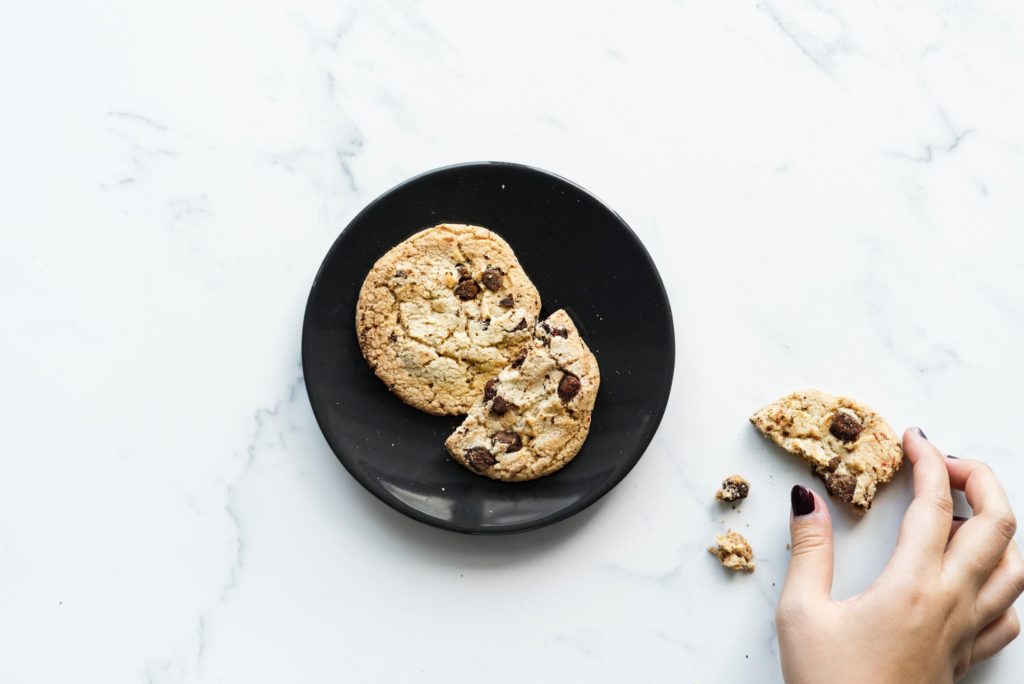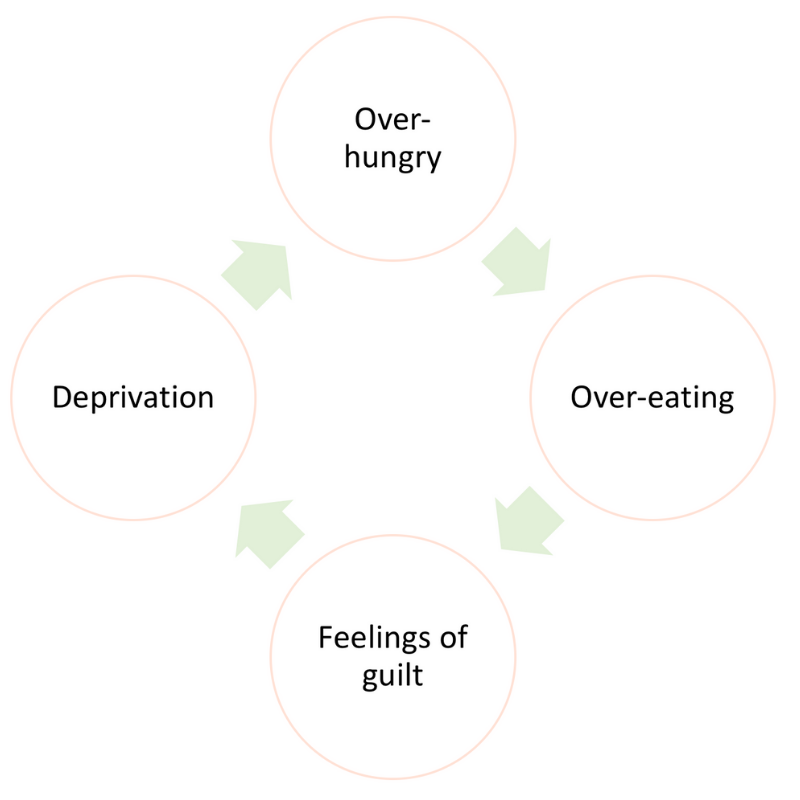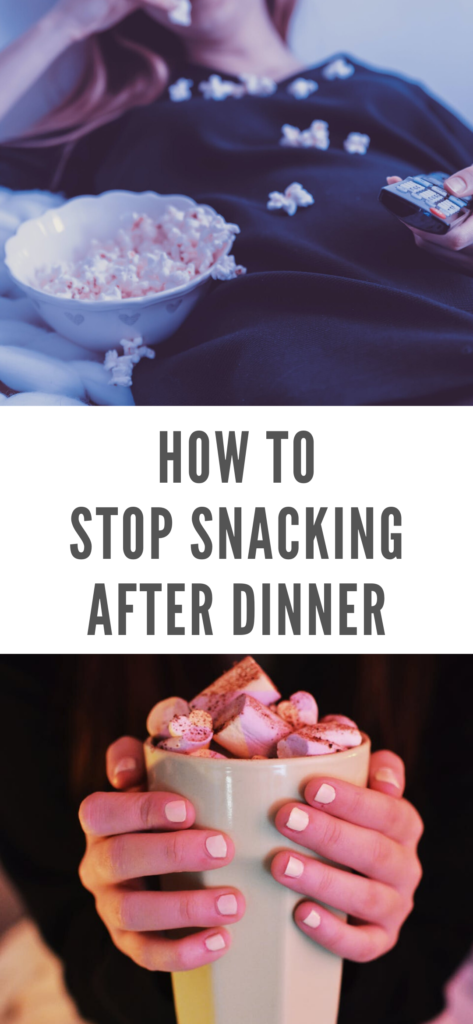How to Stop Snacking After Dinner
If you can’t stop snacking after dinner, it’s not you… it’s what you’ve been told about “healthy eating.” Read below to learn how to stop snacking after dinner (mindlessly) and banish late night cravings, and what you can do throughout the day instead.
It’s 7:30 pm and you just finished dinner – some grilled chicken with broccoli. You clean up the kitchen and hunker down on the couch to watch some Real Housewives for the evening.
And the snack itch creeps in.
So on a commercial you head to the pantry and fill up a small bowl with air-popped popcorn, a healthier alternative of the potato chips you’re really craving.
You finish your bowl of popcorn and head to the kitchen to put your bowl away… but then the freshly baked cookies on the counter catch your eye. So you eat a cookie. Maybe two.
You go back to the couch to try and finish your show, but the pantry keeps calling your name.
Before you know it, you’ve had 4 or 5 different snacks, maybe without it all even registering. You feel full, but also kinda blah, and then a little guilty for snacking your way through your pantry.
After all, you told yourself you wouldn’t do this anymore.
So why are you hitting the pantry?
This is why you can’t stop snacking after dinner…
You’re Not Eating Balanced Meals
If most of your meals consist of just a lean protein and a veggie, it’s no wonder you can’t stop snacking after dinner! Your meals are lacking balance.
The easiest way to remember how to create a balanced meal is to keep my PVCF combo in mind: Protein, Vegetables, (High Fiber) Carbohydrates, and Fats. This variety of nutrients will help promote good health, bounds of energy, blood sugar balance, and satisfaction.
Even more, this combination of nutrients is digested slowly. Eaten on their own, carbohydrates are digested quickly and fat is digested slowly. But when eaten together, along with protein, it’s justttttt right for optimal blood sugar control too.
The biggest culprits I often see omitted from meals are protein and carbohydrates. Protein is the most satiating nutrient, so when you eliminate a significant source of protein from your meals, you may continue to look for something to satiate you. Many people, on the other hand, cut carbs to cut calories and for weight loss purposes. This can backfire tremendously because carbs are comforting and historically our main energy source.
If you want to learn how to eat well-balanced meals, without deprivation or restriction, sign up for the waitlist for my Nutrition Training Program!
Preparing balanced meals doesn’t have to be difficult. Choose a protein, vegetable, (high fiber) carbohydrate, and source of fat at every meal to stave off the after-dinner munchies.
The 50 balanced recipes in my new ebook are PERFECT to boost your satisfaction and help cut after-dinner snacking.
You’re Not Eating Satisfying Meals
Along the same lines as balance, you may not be eating satisfying meals if you can’t stop snacking after dinner.
Is a portion of grilled chicken and steamed broccoli appealing to you? Or would you be more satisfied from grilled fish tacos that not only have WAY more flavor, but are a more balanced meal too?
When you eat less than satisfying meals, your hunger persists. Even if you’re physiologically full from veggies and protein, you’re not mentally satisfied. Your hunger signals in your brain won’t fully shut off until you can check off satisfaction.
So how do you build a satisfying meal? Be sure to include these things:
- Flavor
- Variety
- Fat
- Carbohydrates, like grains and starches
- Food you’re in the mood for!
You’re Under-Eating Earlier In The Day (To “Save” Calories)
Are you being “good” throughout the day so you can “save up” for your favorite dinner? I’m warning you now, this will backfire!
When you try to be “good” throughout the day, you adopt a dieting mentality. This won’t help cut your snacking after dinner… it will urge it on!
Your body will feel starved for calories earlier in the day. Your brain will essentially tell your body that it needs calories and needs them NOW – increasing your cravings for carbohydrate- and fat-heavy foods.
This goes back to the restrict-binge-guilt cycle I discussed here. We want to cut this cycle by avoiding restriction throughout the day.
For more support, join Chelsey’s Accountability Community on Facebook!
What should you do instead?
There are a few steps I suggest for clients to stop snacking after dinner…
- Focus on balanced meals. Take some time to PLAN your meals for the week. Don’t feel pressured to follow your plan to a T, but it’s a good guideline so you have the components to make a balanced meal in your pantry, freezer, and fridge. If you’re looking for more ideas, be sure to order my ebook that’s full of 50 5-ingredient meals that all take less than 20 minutes to make – there’s something for everyone, so you’ll be sure to find an idea that satisfies any craving!
- Give yourself permission to have a snack. If you’re hungry, or a craving just won’t disappear after about 20 minutes, give yourself 100% permission – without guilt – to have a snack. But here’s the catch – think about what you realllllly want to eat, and have that. Stop eating around your cravings!
- When snacking, do so mindfully. Put your snack on a plate and focus on eating – that’s it! Mindfully enjoying your food is an essential component to reducing guilt associated with unplanned snacks. By observing the texture, flavor, aroma, and using all five senses to enjoy your food, you may find yourself more satisfied than if you mindlessly ate it in front of the open fridge, feeling guilty.
Need help conquering nighttime snacking? Learn more tips to stop late night snacking, receive well-balanced recipes, and support for your healthy eating journey from my weekly newsletter.
Reach out at anytime – I’m here to help!
XO






 Hi there!
Thanks for stopping by! I'm Chelsey, an online Registered Dietitian, recipe developer, budding photographer, and coffee addict! My mission is to help you feel good through food by answering the question "What should I eat?" Let's make nutrition approachable!
I hope you enjoy my personal collection of simple, healthy, food allergy friendly and nutritiously delicious recipes, plus tips and tons of tricks that will help YOU live a nutritionally-balanced life! I look forward to getting to know you better...
Hi there!
Thanks for stopping by! I'm Chelsey, an online Registered Dietitian, recipe developer, budding photographer, and coffee addict! My mission is to help you feel good through food by answering the question "What should I eat?" Let's make nutrition approachable!
I hope you enjoy my personal collection of simple, healthy, food allergy friendly and nutritiously delicious recipes, plus tips and tons of tricks that will help YOU live a nutritionally-balanced life! I look forward to getting to know you better...







